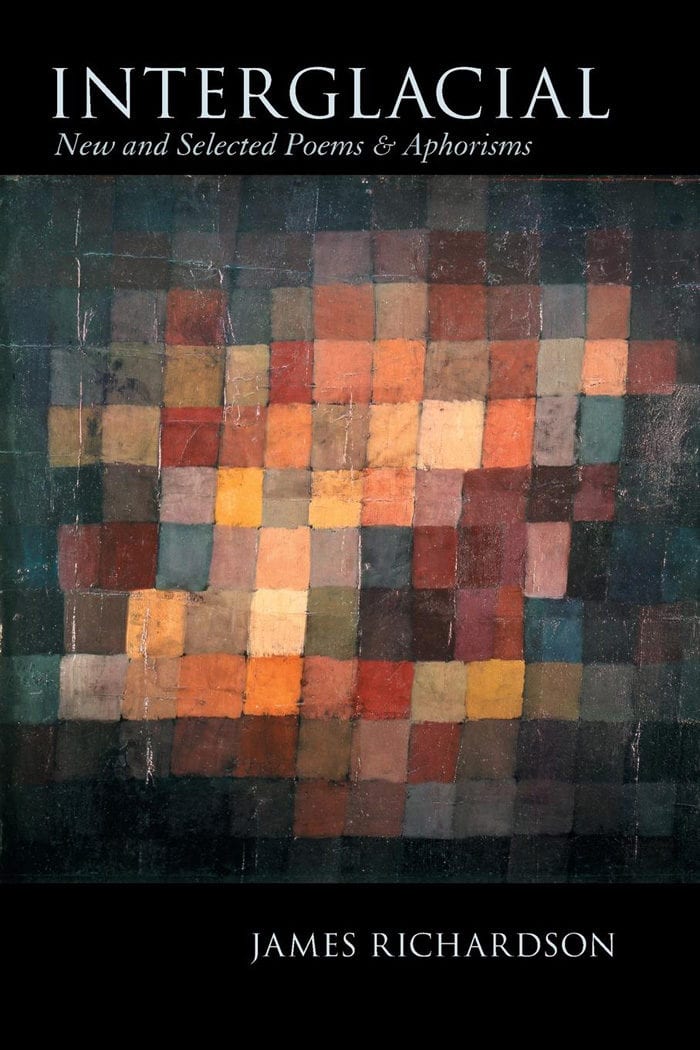
This volume contains Richardson’s collection, Interglacial, as well as a generous retrospective of his previous five, several of which have been out of print for years. Although his diction and musical ear are clearly contemporary and American, Richardson’s sensibility is both lyric—in the classical sense—and philosophical, bringing to mind poets as dissimilar as Wallace Stevens and the Romantics. He has been praised for his fierce and probing intelligence, his subtle and formally tensile music, and his inventive syntax—which Thomas Lux has described as “a gorgeous surge and pull in his sentences.”
ISBN: 9781931337212
Format: Paperback
ISBN: 9781931337052
Format: Hardcover
Reviews
“James Richardson’s Interglacial offers a generous selection of the work of one of America’s most distinctive contemporary poets… What makes the book especially satisfying is the way in which it shows Richardson’s poetic resources steadily expanding and deepening, while remaining in the service of a set of themes and attitudes that are uniquely his own… [A] powerful and moving body of work that in its intimacy and philosophical naturalism is unique in contemporary American poetry.” —Boston Review
“James Richardson’s Interglacial, a poetry finalist for the National Book Critics Circle Award, is like a beautiful river, under the thin surface of which rushes an intensely felt life and a never quite lost yearning to belong. These poems are uncomfortable with comfort, and gravitate toward the chill familiarities of loss. Like a river’s banks, this verse is shaped by erosion, by absence and loss and things borne away. And yet what is revealed by the process of attrition is a thing of lasting loveliness… For Richardson, whose ‘inner land’ is November, the disappointments of a finite lifetime are soul-making; the ravishing compensations of loneliness are the landmarks by which he knows the world and its munificence.” —New Pages
“This feast of a book offers a retrospective from James Richardson’s past five collections, concluding with his latest, Interglacial. Together, the poems reveal the lyrical unfurling of an alert life. Richardson’s… work includes… mischievous, sometimes wistful poems… When he writes of ‘the way we hear under white ice the toiling waters, / the way we are / characters in two different novels / meeting in what reader, / the way you feel / your hands pressed flat, the snow / ticking and streaming on the warm-cold window,’ the risks and awe of human life mingle in one stanza.” —Foreword
“Since 1977, James Richardson has published books of poems that are independent of fads and fashions. Interglacial does what mid-career summaries are supposed to do: demonstrates early promise, development, and new direction—sixty pages of new work are enough to fill its own slim volume. In short lyrics, one-liners, and long multi-part poems, Richardson is concerned with what’s in front of him: things in themselves, the life he’s living. His treatment is economical and direct; these are poems of rigorous observation. Yet he’s always got an oblique angle, a kind of bent thinking. Interglacial is unusual, quirky, personal, and profound.” —Threepenny Review
“Interglacial feels like the life’s work of a man who took what Frost called ‘the road less traveled’—the long way indeed—and made sure to take darn good notes along the way. Read it for its awful beauty.” —Hartford Courant
“These new and selected poems and aphorisms trace the evolution of a poet who earned his reputation as a master of imagery and concision.” —Christian Science Monitor
“James Richardson’s earlier books of poetry and several elegant volumes of literary criticism exhibited a finesse, a delicacy, rarely met with in his generation… If we add to wit and intelligence, remindful of the Metaphysicals, a dash of Rilkean subtlety and insinuatingness, we should have something like a sense of Richardson’s accomplishment [in Interglacial].” —Theodore Weiss
“… There’s a broad, probing, unusual intelligence in [Richardson’s] work, an unusual kind of technical introspection and a wide-ranging inspiration and content that use as their matter images and ideas from sources as far afield as ancient philosophy, contemporary science and philosophy… it is work that brings news to us of packets of mental and emotional experience that haven’t sung so well together in poetry for a longer time than one would care to think.” —C.K. Williams
“[Richardson] tastes life as if it were his calling, and calls forth its savor and shivers.” —Kingdom Books: Letters to/from Home
